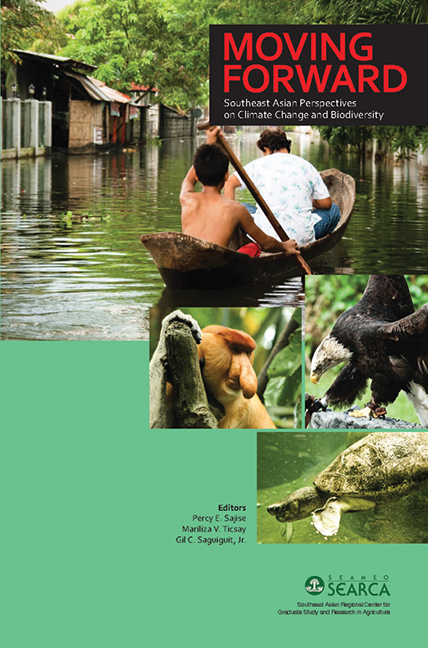Book contents
- Frontmatter
- Contents
- Tables
- Figures
- Foreword
- Preface
- Contributors
- Acronyms
- INTRODUCTION
- REGIONAL PERSPECTIVES AND CROSS-CUTTING ISSUES
- 2 Issues on Climate Change and Biodiversity in the Region
- 3 Climate Change in the Montane Mainland Southeast Asia: Reflections on Water Resources and Livelihoods
- 4 Climate Change, Biodiversity, Livelihoods, and Sustainagility in Southeast Asia
- COUNTRY PERSPECTIVES
- CHALLENGES AND FUTURE ACTIONS
- Index
4 - Climate Change, Biodiversity, Livelihoods, and Sustainagility in Southeast Asia
from REGIONAL PERSPECTIVES AND CROSS-CUTTING ISSUES
Published online by Cambridge University Press: 21 October 2015
- Frontmatter
- Contents
- Tables
- Figures
- Foreword
- Preface
- Contributors
- Acronyms
- INTRODUCTION
- REGIONAL PERSPECTIVES AND CROSS-CUTTING ISSUES
- 2 Issues on Climate Change and Biodiversity in the Region
- 3 Climate Change in the Montane Mainland Southeast Asia: Reflections on Water Resources and Livelihoods
- 4 Climate Change, Biodiversity, Livelihoods, and Sustainagility in Southeast Asia
- COUNTRY PERSPECTIVES
- CHALLENGES AND FUTURE ACTIONS
- Index
Summary
AGROFORESTRY AS PART OF THE CLIMATE CHANGE MITIGATION/ADAPTATION NEXUS
The IPCC (2007) has compiled strong scientific evidence that the global climate is changing at rates not seen in recent geological history. This change is causally linked to changes in the composition of the atmosphere. This in turn is largely caused by an increase of the Greenhouse Gas (GHG) effect due to emissions of CO2 that had been stored in the past as energy-rich organic compounds or as calcium carbonate. The CO2 are released by use of fossil fuel or cement. About 20 per cent of the increase in GHGs gasses is caused by the release of CO2 that has been stored for hundreds or thousands of years, in aboveground forest biomass or peat soils. International agreement on emission reduction is hard to reach mainly due to the large differences in per capita emissions between countries. Countries with high historical emissions do not want to accept equal per capita emission rights.
While the Kyoto accord related emission reduction targets to the 1990 emission levels, a further reduction will have to provide a pathway towards globally equitable emissions, not exceeding the carrying capacity of the atmosphere and oceans. Rapid increases in the GHG effect can lead to positive feedback loops by triggering the release of CO2 and CH4 from boreal zones, reduction of uptake capacity by the oceans, and/or changes in the circulation patterns of oceans (the ‘conveyor belt’ that links all oceans) or atmosphere (‘tropics’).
Indonesia will be affected by climate change, but it is also co-responsible for the change. If the recent estimates of emissions from peat soils and forest fires are correct (Figure 4.1), the per capita emissions of Indonesia are 30 per cent higher than most European countries, but still below those of the USA, the only Annex-I country that has not ratified the Kyoto agreement. Published Ecological Footprint (EFP) data (Figure 1C; data source: World Wildlife Fund 2006) provide an indicator of the level of simplicity of the Human Development Index (HDI) or Gross Domestic Product (GDP).
- Type
- Chapter
- Information
- Moving ForwardSoutheast Asian Perspectives on Climate Change and Biodiversity, pp. 55 - 84Publisher: ISEAS–Yusof Ishak InstitutePrint publication year: 2010

